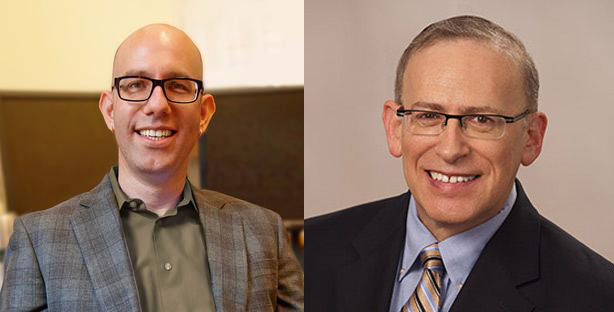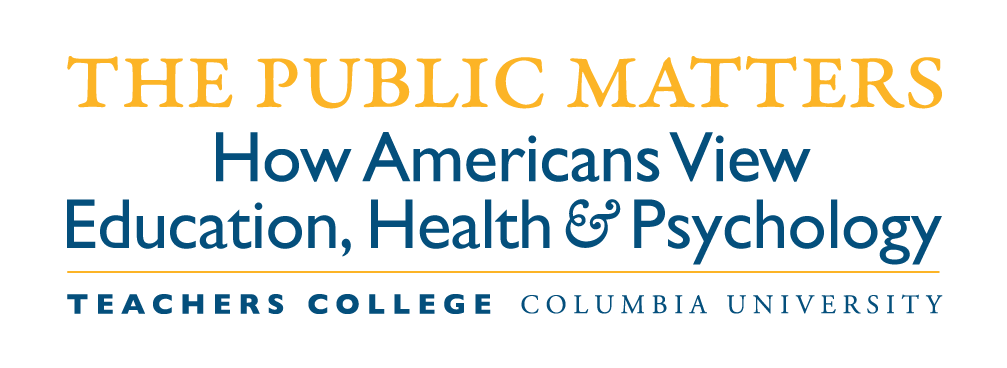Who are today’s education activists? Do Americans consider higher education a worthwhile investment? Do they trust the business leaders who are increasingly shaping education policy? Watch out, Pew, Gallup and Quinnipiac – a Teachers College-based opinion survey called “The Public Matters: How Americans View Education, Health & Psychology” is on the case.
“Despite the important role public opinion plays in setting public policy, only limited efforts have been made to document public opinions about education, psychology and health,” write the project’s directors, Aaron Pallas, Arthur I. Gates Professor of Sociology & Education, and Oren Pizmony-Levy, Assistant Professor of International & Comparative Education.

PULSE-TAKERS Pizmony-Levy and Pallas are tapping TC’s broad faculty expertise to create surveys on different issues.
Backed by the TC Provost’s Investment Fund, The Public Matters taps the College’s diverse faculty expertise.
For example, a survey on how Americans view community schools was co-authored by TC Associate Vice President Nancy Streim, who led creation of the pre-K—8 Teachers College Community School in West Harlem. Nearly two-thirds (65 percent) of the survey’s respondents supported this statement: “Students cannot develop basic academic skills without community resources, health and social services.” And an overwhelming 92 percent of respondents said they agree that teachers should look “beyond a student’s current academic performance to all aspects of a person’s well-being.”
Despite the important role public opinion plays in setting public policy, only limited efforts have been made to document public opinions about education, psychology and health.”
—Aaron Pallas and Oren Pizmony-Levy
The survey on higher education was co-authored by Noah D. Drezner, Associate Professor of Higher Education and founding editor of the journal Philanthropy & Education. More than three-quarters, or 76 percent, of the survey’s respondents said they see public spending on higher education in the United States as an excellent or good investment, returning benefits to individuals and society as a whole. About 17 percent called it a fair investment, and only seven percent said it has not been a good investment. And 83 percent said higher education institutions contribute a lot or somewhat to scientific advances that benefit American society and the public good, while 73 percent say they contribute a lot or somewhat to national prosperity and development. (Read a story in Inside Higher Education about the survey and listen to a Fresh Ed podcast featuring Drezner and Pizmony-Levy.)

The Public Matters “takes the pulse of ordinary Americans,” spotlighting disconnects with past assessments and current policies. For example, in its survey on education activism it finds a high degree of mobilization around education issues in general, particularly among those who believe in public education and feel it is under attack. Indeed, nearly one-third of respondents indicated that during the previous year they had engaged in at least one form of political or social activism around education issues, from writing letters and signing petitions to marching on state houses and calling for pay raises for teachers and more funding for public schools. Those who had engaged in at least one action in the previous 12 months were the most likely to advocate for much higher spending on education.
The public is clearly signaling to policy makers that it’s time to try new types of reforms.”
—Oren Pizmony-Levy
And as schools eliminate programs in order to focus on improving math and literacy, The Public Matters finds a strong appetite for the health and social services community schools provide.
“The public is clearly signaling to policy makers that it’s time to try new types of reforms,” says Pizmony-Levy said of those findings. “Ones that invest not only in improving instruction and curriculum, but also invest in the whole child and families.
The Public Matters is preparing reports on public opinion regarding K-12 curriculum (which topics/issues should be taught in school; the role of the government in encouraging/discouraging different organizational forms of schooling (public schools, private schools, charter schools, etc.); the best university/college; public spending on education in the United States and other countries; and the U.S. health care system.
